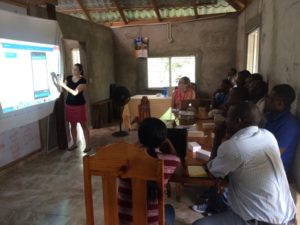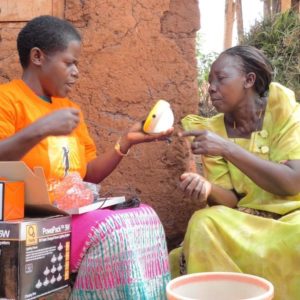
Search
Over the past 25 years, most people in emerging markets have been leapfrogging technology by going directly from little to no communications access, to wireless voice and data service. Looking back, two personal experiences illustrate this shift.

Mexico City, 1994: Only rich people had mobile phones. To get a landline from the government monopoly, you had to wait more than a year and put down a $1,000 deposit. Instead, we climbed to the roof of our apartment building and re-routed a friend’s unused second phone line down to our apartment window. Presto – phone service. We paid the bills, but to this day I have no idea who José Luis Castaneda, the putative owner of the phone line, was.
Dar es Salaam, Tanzania, 2011: I walked three blocks down the street to a Vodacom shop and got a local SIM card for my iPhone. Ten minutes later, I walked back into my apartment with mobile service.
Today, the information technology tools most companies use to do their work are changing just as dramatically. Over the next 20 years, most emerging market field staff will be leapfrogging technology – moving from working with pencil and paper to directly using apps on a mobile device, without pausing for laptops or desktops along the way.
A recent A16Z podcast,“The $200 PC in the Enterprise,” pointed out that US enterprises are also moving away from desktop computing to mobile platforms, much as they moved away from mainframes to desktop computing in the 80s and 90s.
Why? It’s worth listening to the whole podcast, but here’s the summary:
And listening to this I thought, “So US corporations are trying to evolve toward the IT infrastructure that many TaroWorks customers are already using today!” Though our customers have been leapfrogging technology from paper to mobile, they are doing it for various reasons. Here are some of their stories.
TaroWorks customer SOIL Haiti – a social enterprise which provides access to safe, dignified and ecological sanitation – woun up leapfrogging technology when it skipped laptops and went directly to mobile devices as a way to scale the productivity of its EcoSan field services teams.
“Running our service generates a lot of data. We (are) tracking everything from monthly subscription fees, to customer complaints and prior to using TaroWorks, all of that data was collected with pen and paper and then usually eventually entered into excel spreadsheets,” said SOIL Systems Director Erica Lloyd, during a 2017 webinar. That approach “…worked pretty well when we had about 100 customers but by the time we had scaled to 500 customers (SOIL now has more than 1,000) it was clear that our ability to scale further was limited in part by our lack of an integrated, flexible mobile data management system.” (Read More)
Relying on pen, paper and multiple yet unconnected spreadsheets created lag time in data entry and analysis, depriving field teams of up-to-date customer information and managers of the metrics they needed to spot correlations essential to helping the business move towards financial sustainability, said Lloyd. Integrating the TaroWorks mobile app front end with their existing Salesforce.com cloud database addressed those and other obstacles.

SOIL team members are trained on the use of TaroWorks.
Lloyd cautions, though, that leapfrogging technology by moving from labor intensive paper or spreadsheet-based data collection, analysis and management to a mobile, cloud-based approach has its own challenges.
“It’s really important to put in the upfront investment in helping your team learn the tools and the technology,” said Lloyd. “Some of our users were completely new to smartphones in general so we spent a lot of time just getting people comfortable with the phones and then doing a lot of practice in TaroWorks before we let them use it in the field.” (Read More)
TaroWorks customer Solar Sister actually did make a brief attempt at moving from paper to laptop entry, but ended up quickly switching to mobile devices mainly because of the challenges of handling paper invoices from product sales. The organization’s business development associates serve a network of 3,000 entrepreneurs who sell solar products, supplied by Solar Sister, in rural Uganda, Tanzania and Nigeria.
“For invoices, entrepreneurs were making entries via laptops and shipping paper receipts to the branch offices monthly or quarterly for auditing purposes,” according to a 2017 webinar. “The system worked but wasn’t ideal because receipts were frequently damaged en route to the office, and they had to dedicate an entire room just to house the physical receipts.” (Read More)
By using a mobile app like TaroWorks, Solar Sister was able to:

Solar Sister entrepreneur demonstrates solar lamp
That these organizations regard laptops as cumbersome, expensive and not suited to purpose, reminds me of a previous IT transition also underway during my Mexico days.
I was the assistant managing editor at the The News (Mexico City), an English language daily put out by a large Mexican publishing house. They were early adopters of computerization and so our editing software ran on a 1970s era mainframe and terminal system. There was no mouse, no WYSIWYG. It didn’t even run DOS. The user interface was command prompts on green screens.
Downstairs from the newsroom, 10 grey boxes, each about half the size of a refrigerator, filled up a quarter of a large server room. They were the storage hard drives for the mainframe; each unit could hold 20 megabytes of data.
After I had worked there six months, the company upgraded to a new PC-based system. Five desktop servers replaced a roomful of equipment, gave us a 20-year advance in user interface, and cost less than 10% of the original system.
With leapfrogging technology in full swing, I expect that 10 years from now, most IT departments in emerging markets will regard issuing laptops to field staff as the modern-day equivalent of refrigerator-sized hard drives.
POST TOPICS
Sign up to receive emails with TaroWorks news, industry trends and best practices.
TaroWorks, a Grameen Foundation company.
Site by V+V